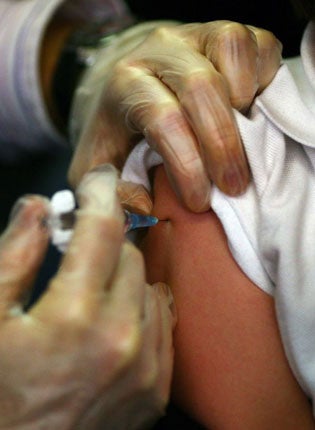The return of scarlet fever
Cases in Britain rise by 50 per cent in just a year

Your support helps us to tell the story
From reproductive rights to climate change to Big Tech, The Independent is on the ground when the story is developing. Whether it's investigating the financials of Elon Musk's pro-Trump PAC or producing our latest documentary, 'The A Word', which shines a light on the American women fighting for reproductive rights, we know how important it is to parse out the facts from the messaging.
At such a critical moment in US history, we need reporters on the ground. Your donation allows us to keep sending journalists to speak to both sides of the story.
The Independent is trusted by Americans across the entire political spectrum. And unlike many other quality news outlets, we choose not to lock Americans out of our reporting and analysis with paywalls. We believe quality journalism should be available to everyone, paid for by those who can afford it.
Your support makes all the difference.Government advisers are to review crucial defences against some of Britain's "forgotten" diseases after doctors reported steep rises in the number of people suffering from scarlet fever and whooping cough.
Ministers have ordered their medical experts to resurrect a proposal to introduce a "booster" vaccine for whooping cough (pertussis) following the disclosure that incidents of the potentially fatal illness had nearly doubled in a year.
The Joint Committee on Vaccination and Immunisation (JCVI) will now reconsider whether to offer older children protection against the disease.
Doctors and hospitals have also been put on alert for outbreaks of scarlet fever, an infection once feared for causing epidemics that killed thousands of people throughout Europe 200 years ago.
The action was sparked after the latest official figures revealed that new scarlet fever cases in the UK had soared close to 3,000 last year – a rise of 50 per cent on the results for 2007.
Health officials last night attempted to play down the significance of the increases, blaming them on "cyclical" changes in infection patterns. However, one of Britain's top microbiologists said that the figures gave a disturbing insight into the continued vulnerability of the population, despite the success in reducing rates of measles, mumps and rubella after the MMR vaccine scare.
Hugh Pennington, emeritus professor of bacteriology at Aberdeen University, said the figures could also demonstrate that the country was still struggling with the legacy of a loss of faith in the whooping cough vaccine more than 30 years ago. He said: "There was a claim that the vaccine could cause problems and many people boycotted it. If that happens, the bug can always come back with a vengeance.
"We have a different vaccine now, but this increase in infections suggests more people, not just pre-school children, should be taking it."
Dr Richard Jarvis, chairman of the British Medical Association's public health committee, said: "The vaccine works very well, but its effectiveness wanes over time."
Scottish doctors last year urged parents of newborns to have them vaccinated against whooping cough. A team from Edinburgh called for the change in vaccination policy after two babies at their hospital died from the disease. Children are currently vaccinated at two, three and four months and again before they start school. But immunity is not lifelong and older teenagers and adults are still susceptible to the disease.
It emerged that the JCVI had considered extending the whooping cough vaccination programme 18 months ago, but rejected the proposal because they decided that infection rates were not high enough to justify the change.
Minutes from a JCVI meeting in October 2007 declare that: "The ... data gave no indication of an emerging public health problem ... Pertussis rates have continued to go down following the introduction of the pre-school booster ..."
However, it has now emerged that whooping cough notifications rose from 539 in 2006 to more than 1,000 the following year.
Join our commenting forum
Join thought-provoking conversations, follow other Independent readers and see their replies
Comments